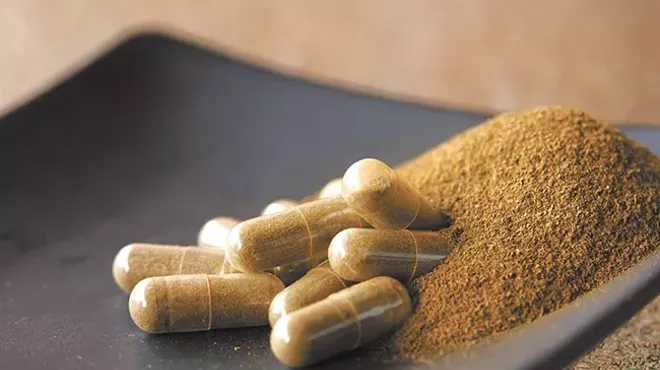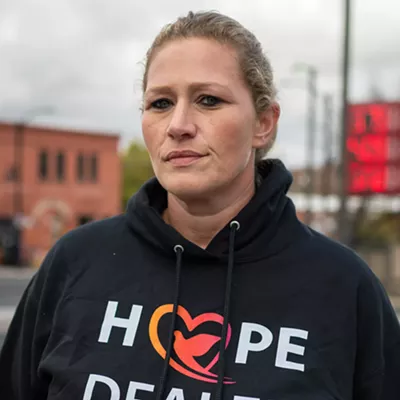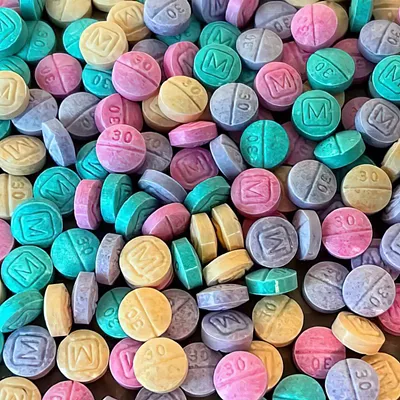It's not even noon on Friday last week and Jerome Simmons has already sold $720 worth of kratom from his one-room, bare-bones head shop in north-central Spokane. That's 3 kilograms (a little more than 6½ pounds) of the plant-based supplement made from the finely ground leaves of the tree of the same name. Kratom is typically used for its pain-relieving and energy-giving effects.
Simmons cuts open a cardboard box that recently arrived at Sedated Smoke Shop from Indonesia. Inside are two tightly wrapped bricks, the kind of packages you see on TV that typically have illegal drugs in them. The brown powder inside each brick is not illegal, but that will soon change.
Together, the two bricks total 10 kilograms that Simmons will weigh out into plastic bags and capsules. He points to several boxes on the other side of the room, and the bags of brown powder already packaged and ready for sale behind him. He estimates that he has about 120 kilograms of kratom left (as of last week). It'll all be gone in two weeks. As of Sept. 30, kratom will be illegal in the United States, and Simmons will be forced to discontinue what's accounted for a sizable chunk of his business.
Last month, the Drug Enforcement Administration announced that kratom will be added to the list of Schedule I substances — the most restrictive classification under the Controlled Substances Act — for the supplement's apparent lack of any accepted medicinal purpose and ostensibly high potential for abuse. The Schedule I list also includes heroin, LSD, MDMA (ecstasy), peyote and, of course, marijuana.
The DEA's announcement was met with outrage from those who use the herbal supplement as a substitute for addictive prescription pain pills or anti-anxiety medication, and recovering addicts who use kratom to wean themselves off heroin or other opiates.
"A lot of people are freaking out about the ban, so they're stocking up," Simmons says. "As far as the government saying there's no medical use for it, I feel like that's ridiculous. People have been using this for at least as long as they've been using weed. It's used in medicine in other countries."
Kratom is a tree native to Southeast Asia, a relative of the tree that produces coffee. Its leaves contain psychoactive alkaloids that attach to opioid receptors in the brain. Its use for recreation and medicinal purposes has spiked in recent years in the U.S. as head shops and gas station convenience stores started stocking it. Simmons has sold it since 2009. There are even kratom bars in Colorado, New York and North Carolina that serve a brewed drink.
Traditionally, farmers and laborers would chew on the tree's sour-tasting leaves for an energy boost and relief from the day's strenuous physical work. More commonly today, kratom leaves are ground into a fine powder and put in capsules or mixed with hot water.
Simmons stocks seven different strains of kratom, each one conjuring different potencies and effects ranging from euphoria to relaxation to energy to pain relief.
A handful of other shops in and around Spokane carry kratom as well, but the large majority of the marketplace exists on the internet. As such, many people across the country have taken to online forums, message boards and social media to express their disdain for the DEA's decision. The hashtags #IAmKratom and #KratomSavesLives on Twitter elicit videos and passionate testimonials to the plant's healing effects. The American Kratom Association was founded in 2014 to lobby against bills banning the substance at the state level. Currently, a handful of states have banned the substance.
Kratom will be added to the Schedule I list on a temporary, two-year basis at first. Specifically, the ban will apply to two materials found in kratom — the alkaloids mitragynine and 7-hydroxymitragynine.
According to the Centers for Disease Control, kratom-related calls to poison centers in the U.S. have increased tenfold from 2010 to 2015, for a total of 660 calls during that time. Kratom-related deaths are relatively rare (the DEA estimates 15 from 2014-16); some have occurred when the herb is mixed with other intoxicants. For context, about 28,000 people died of prescription opioid and heroin overdoses in 2014, more than any other year on record.
Additionally, a New York Times article from earlier this year asserted that kratom can in fact be addictive and lead recovered heroin users to relapse, though scientific research into the plant's short- and long-term effects is scarce.
Simmons has tried kratom himself, but says he doesn't take it regularly. He sees repeat customers — some who come in on a daily basis — most of whom are middle-class workers, he says.
"It's going to be a pretty big hit." ♦




















